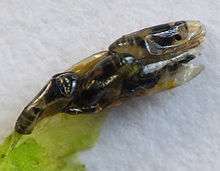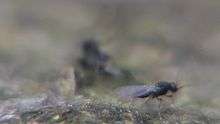Platygastridae
| Platygastridae | |
|---|---|
 | |
| Platygaster pupae inside gall | |
| Scientific classification | |
| Kingdom: | Animalia |
| Phylum: | Arthropoda |
| Class: | Insecta |
| Order: | Hymenoptera |
| Suborder: | Apocrita |
| Superfamily: | Platygastroidea |
| Family: | Platygastridae |
| Subfamilies | |
|
see text | |
The hymenopteran family Platygastridae (sometimes incorrectly spelled Platygasteridae) is a large group (over 1100 species) of exclusively parasitoid wasps, mostly very small (1-2 mm), black, and shining, with elbowed antennae that have an eight-segmented flagellum. The wings most often lack venation, though they may have slight fringes of setae.

The two subfamilies are the Platygastrinae and the Sceliotrachelinae. The former subfamily includes some 40 genera, all of which are koinobionts on cecidomyiid flies; the wasp oviposits in the host's egg or early instar larva, and the wasp larva completes development when the host reaches the prepupal or pupal stage. The latter subfamily is much smaller, including some 20 genera, and they typically have the rudiments of a vein in the forewings. They are generally idiobionts, attacking the eggs of either beetles or Hemiptera.
The former family Scelionidae is now considered to be another subfamily of Platygastridae, along with the subfamilies Teleasinae and Telenominae.
References
- Peter N. Buhl and David G. Notton, 2009 A revised catalogue of the Platygastridae of the British Isles Journal of Natural History Vol. 43, Nos. 27-28,1651-1703
External links
- a citrus blackfly parasitoid, Amitus hesperidum on the UF / IFAS Featured Creatures Web site
- Baeus latrodecti Dozier on the UF / IFAS Featured Creatures Web site